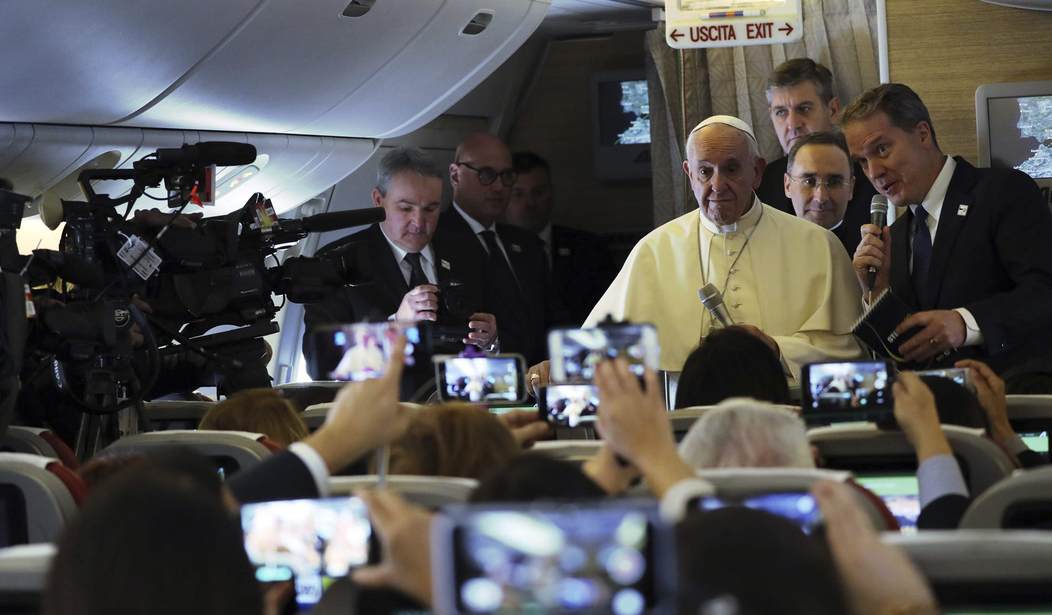Pope Francis stressed to news consumers to watch out for fake news because “there is no such thing as harmless disinformation; on the contrary, trusting in falsehood can have dire consequences.”
In his message “’The truth will set you free’ (Jn 8:32): Fake news and journalism for peace,” the pope stressed that the business of communications “is part of God’s plan for us and an essential way to experience fellowship,” but “when we yield to our own pride and selfishness, we can also distort the way we use our ability to communicate.”
“The capacity to twist the truth is symptomatic of our condition, both as individuals and communities,” he added.
The pope issued the message to mark the Catholic Church’s World Communications Day, which falls on May 13, the Sunday before Pentecost.
Pope Francis noted that the spread of “fake news” calls for reflection and “rediscovering the dignity of journalism and the personal responsibility of journalists to communicate the truth.”
He defined fake news as “false information based on non-existent or distorted data meant to deceive and manipulate the reader,” which “can serve to advance specific goals, influence political decisions, and serve economic interests.”
“This false but believable news is ‘captious,’ inasmuch as it grasps people’s attention by appealing to stereotypes and common social prejudices, and exploiting instantaneous emotions like anxiety, contempt, anger and frustration. The ability to spread such fake news often relies on a manipulative use of the social networks and the way they function. Untrue stories can spread so quickly that even authoritative denials fail to contain the damage,” the pontiff said.
“Disinformation thus thrives on the absence of healthy confrontation with other sources of information that could effectively challenge prejudices and generate constructive dialogue; instead, it risks turning people into unwilling accomplices in spreading biased and baseless ideas,” he added. “The tragedy of disinformation is that it discredits others, presenting them as enemies, to the point of demonizing them and fomenting conflict. Fake news is a sign of intolerant and hypersensitive attitudes, and leads only to the spread of arrogance and hatred. That is the end result of untruth.”
No one, Pope Francis said, is “exempted from the duty of countering these falsehoods.”
“This is no easy task, since disinformation is often based on deliberately evasive and subtly misleading rhetoric and at times the use of sophisticated psychological mechanisms,” he continued, praising efforts to teach news consumers how to “take an active part in unmasking falsehoods, rather than unwittingly contributing to the spread of disinformation.”
“What is at stake is our greed. Fake news often goes viral, spreading so fast that it is hard to stop, not because of the sense of sharing that inspires the social media, but because it appeals to the insatiable greed so easily aroused in human beings. The economic and manipulative aims that feed disinformation are rooted in a thirst for power, a desire to possess and enjoy, which ultimately makes us victims of something much more tragic: the deceptive power of evil that moves from one lie to another in order to rob us of our interior freedom,” the pope said. “That is why education for truth means teaching people how to discern, evaluate and understand our deepest desires and inclinations, lest we lose sight of what is good and yield to every temptation.”
He quoted Dostoevsky as “illuminating”: “People who lie to themselves and listen to their own lie come to such a pass that they cannot distinguish the truth within them, or around them, and so lose all respect for themselves and for others.”
“To discern the truth, we need to discern everything that encourages communion and promotes goodness from whatever instead tends to isolate, divide, and oppose,” Pope Francis advised. “…An impeccable argument can indeed rest on undeniable facts, but if it is used to hurt another and to discredit that person in the eyes of others, however correct it may appear, it is not truthful.”
“The best antidotes to falsehoods are not strategies, but people: people who are not greedy but ready to listen, people who make the effort to engage in sincere dialogue so that the truth can emerge; people who are attracted by goodness and take responsibility for how they use language.”
The pope called journalists “protectors of the news,” noting that “in today’s world, theirs is, in every sense, not just a job; it is a mission.”
“Amid feeding frenzies and the mad rush for a scoop, they must remember that the heart of information is not the speed with which it is reported or its audience impact, but persons,” he said. “Informing others means forming others; it means being in touch with people’s lives.”
“I would like, then, to invite everyone to promote a journalism of peace. By that, I do not mean the saccharine kind of journalism that refuses to acknowledge the existence of serious problems or smacks of sentimentalism. On the contrary, I mean a journalism that is truthful and opposed to falsehoods, rhetorical slogans, and sensational headlines. A journalism created by people for people, one that is at the service of all, especially those – and they are the majority in our world – who have no voice. A journalism less concentrated on breaking news than on exploring the underlying causes of conflicts, in order to promote deeper understanding and contribute to their resolution by setting in place virtuous processes. A journalism committed to pointing out alternatives to the escalation of shouting matches and verbal violence.”









Join the conversation as a VIP Member